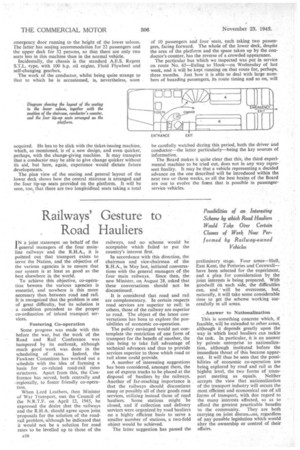Railways' Gesture to Road Hauliers
Page 28

If you've noticed an error in this article please click here to report it so we can fix it.
Possibilities of an Interesting Scheme by which Road Hauliers Would Take Over Certain Classes of Work Now Performed by Railway-owned Vehicles IN a joint statement on behalf of the 1 general managers of the four mainline railways and the R.H.A., it is poihted out that transport exists to serve the Nation, and the objective of the various agencies is to ensure that our system is at least as good as the best elsewhere in the world.
To achieve this objective, co-operation beween the various agencies is essential, and nowhere is this more necessary than between road and rail. It is recognized that the problem is one of great difficulty, but its solution is a condition precedent to the proper co-ordination of inland transport services.
Fostering Co-operation
Some progress was made with this before the war, but the work of the Road and Rail Conference was hampered by its outbreak, although much good work was done in the scheduling of rates. Indeed, the Fawkner Committee has worked out a schedule with the idea of forming a basis for co-related road-rail rates structures. Apart from this, the Conference has served, both centrally and ,regionally, to foster friendly co-operation, When Lord Leathers, then Minister of War Transport, met the Council of the N.R.T.F. on April 12, 1945, he expressed the desire that the railways and the R.H.A. should agree upon joint proposals for the solution of the roadrail problem, -although he indicated that it would not be a solution for road rates to be levelled up to those of the
railways, and no scheme would be acceptable which failed to put the country's interest first.
In accordance with this direction, the chairman and vice-chairman of the R.H.A., in May last, initiated conversations with the general managers of the four main railways, Since then, thenew Minister, on August 28, asked that these conversations should not be discontinued.
It is considered that road and rail are complementary. In certain respects road services are superior to rail; in others, those of the railway are superior to road. The object of the latest conversations has been to explore the possibilities of economic co-operation.
The policy envisaged would not contemplate the restriction of one form of transport for the benefit of another, the aim being to take full advantage of technical advances and thus to provide services superior to those which road or rail alone could provide.
A number of interesting suggestions has been considered, amongst them, the use of express trucks to be placed at the disposal of hauliers by the railways. Another of far-reaching importance is that the railways should discontinue many or possibly all of their goods road services, utilizing instead those of road hauliers. Some stations might be closed, and if collection and delivery services were organized by road hauliers on a highly efficient basis to serve a smaller number of stations, a two-fold object would be achieved.
The latter suggestion has passed the preliminary stage. Four areas—Hull, East Kent, the Potteries and Cornwall— have been selected for the experiment, and a plan for consideration by the joint interests is being prepared. With goodwill on each side, the difficulties can, and • will be overcome, but, naturally, it will take some considerable time to get the scheme working successfully in all areas, , Answer to Nationalization This is something concrete which, if feasible, will be extended to other areas, although it depends greatly upon the way in which local hauliers can tackle the task. In particular, it is an answer by private enterprise ' to nationalization, although instituted before the immediate threat of this became apparent. It will thus be seen that the possibilities of economic co-operation are being explored by road and rail at the highest level, the two forms of transport meeting as equals. Neither accepts the view that nationalization of the transport industry will secure the most efficient and economical use of all forms of transport, with due regard to the many interests affected, so as to afford the greatest practicable benefits to the community. They are both carrying on joint discuss.ons, regardless of any possible legislation which would alter the ownership or control of their affairs.




















































